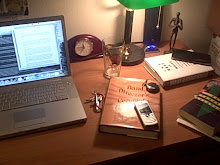Anyone who asserts that the colonists comprised people who wished to escape persecution is envisioning only half of them.
There have always been two ideological strands in America. In the beginning were Puritans and Patriots. The Puritans, who arrived first, didn't want to break with the mother country so much as establish Christian colonies of it there. The Patriots sought to leave the homeland and establish a new government based on Enlightenment principles.
The Puritans were adverse to the idea of establishing government, especially self-government: as strict Christians their worldview was based on a monarchical, theocratic model. Politically, they weren't seeking to change things, and hence were "conservatives". The Patriots, on the other hand, sought to end tyranny and establish self-rule on the basis of the principles of human dignity and equality. Focused on liberty, they were radical "liberals".
Neither of these strands has ever gone away; rather, they have evolved. Each of them has endured periods of relative strength and dormancy in the ensuing decades. Clearly, for example, the liberal Enlightenment Patriot strand was dominant from FDR's administration through Carter's and the conservative Christian Puritan strand has been dominant since the Reagan administration.
Today, the followers of the Puritans are our "religious right conservatives" and the followers of the Patriots our "left-leaning liberals". Generally, those with Puritannical orientation favor religion and don't trust government, and those of a Patriotic bent trust government and don't favor religion. This follows from their roots. You can see where present-day Puritans instinctively want to return to those roots (faith-based initiatives, the unitary executive idea, inserting Creationism into schools, keeping the size of government to an absolute minimum, home schooling), as well as present day Patriots (separation of church and state, enforcing balance of power, supporting science over religion, public programs and common causes).
The recent right-wing religious fervor has been widely noted as "the New Puritanism". The Puritans were not, and are not, seeking to escape religious persecution. They are the religious persecutors. It was the Patriots and their modern-day counterparts that sought and seek to evade and eliminate religious persecution--including by inclusion of Creationist materials in public school textbooks.
The genius of the Founders lies in the way they constructed a system of compromise, checks and balances that allows each side expression, and virtually guarantes that neither side can hold a permanent advantage. The present danger is that political ideologues have been attempting dismantle the Founders' system (the "permanent Republican majority", and idea which would be just as dangerous if it was the "permanent Democratic majority").
This is a gross oversimplification of the situation, intended only to put things in perspective. The main point is that we have a healthy, dynamic, yin-yang situation that, despite challenges, is not likely to go away.
The Price Of Progress
7 hours ago

No comments:
Post a Comment